Longdu Ice Dessert Parlor (龍都冰果專業家) is no stranger to weathering outbreaks.
Nearly 60 years before COVID-19 forced the Wanhua District (萬華) store to shut down in May, it was banned from selling frozen treats during Taipei’s last major cholera epidemic in 1962.
The shop turned to serving soda to survive, devising a way to beat the competition by pouring drinks over large chunks of ice — which made the fizz and flavor last longer. This was just one of the myriad adjustments the shop has gone through since current owner Lee Ming-tan’s (李明潭) grandfather started selling iced sweet rice noodles in the street in 1920 from a shoulder pole.
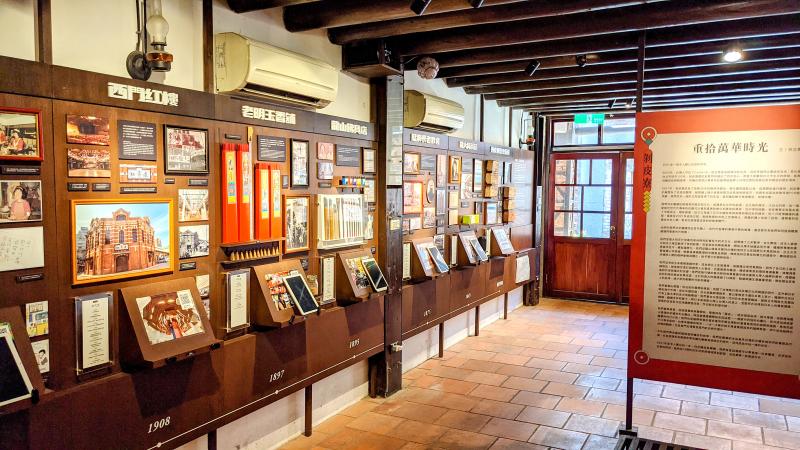
Photo: Han Cheung, Taipei TImes
Lee’s grandfather was arrested and beaten by the Japanese police for buying black market sugar, but he persisted after the ordeal, which cemented his brand’s local reputation.
Longdu is one of 13 century-old Wanhua businesses featured in Bopiliao Historic Block’s A Century of Craftsmanship — The Wanhua Story (百年匠心:重拾萬華時光) exhibit, which opened yesterday after people were finally allowed to dine in without partitions on Tuesday. The mood was celebratory and speakers became emotional when discussing the outbreak, which hit Wanhua the hardest and saw the historic site turn into a rapid-testing station for over a month.
“[The outbreak] was like a battle, and now we’re trying to return to our everyday lives,” Bopiliao Historic Block director Yeh Yi-ching (葉益青) says. “Through this exhibition, I hope people can begin returning to the historic block.”
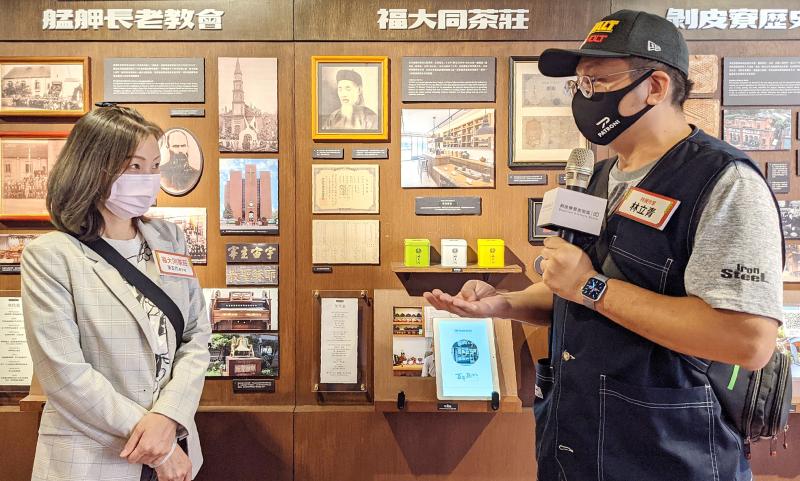
Photo: Han Cheung, Taipei TImes
Many local guests spoke of the tenacity of Wanhua’s people, not just surviving this latest challenge but keeping their shops alive for a century. Several owners were in attendance, and the host made sure to introduce which generation they belonged to — Fulldone Old Tea (福大同) and Longshan Buddha Shop (龍山佛具), for instance, are both on their sixth generation.
The exhibition is a continuation or upgrade of last year’s show featuring 10 businesses, with Longdu being one of three new additions to the roster.
“This exhibit is alive and ongoing; each year we will continue to find new shops and tell their stories,” Yeh says.
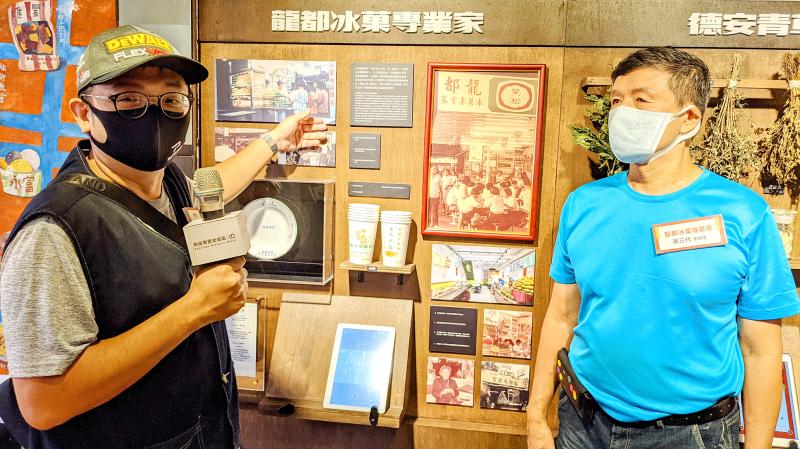
Photo: Han Cheung, Taipei TImes
Author Lin Li-ching (林立青) led a tour of the exhibition during the opening, focusing on the adjustments each generation of owners made to their shops over the years. Lin was tasked with interviewing the shop owners and writing the exhibition’s text (unfortunately only the main parts are translated into English).
“We can see how these shops have dealt with regime changes, disease outbreaks, war, urban planning and all sorts of other factors that have affected local life,” Lin says. “This needs to be done now as different generations tend to remember different things. Some have forgotten a lot, and some need to be shown old photos to jog their memory on what sort of different tools they used in the past.”
Policy changes also play a big part — restaurants went from using porcelain bowls to disposable ones over the decades, but had to adjust again due to recent environmental concerns. Medicinal herb shops started out taking on more of a physician role, but after the government implemented regulations for medical practitioners, they switched their focus to providing healthy herbal brews.
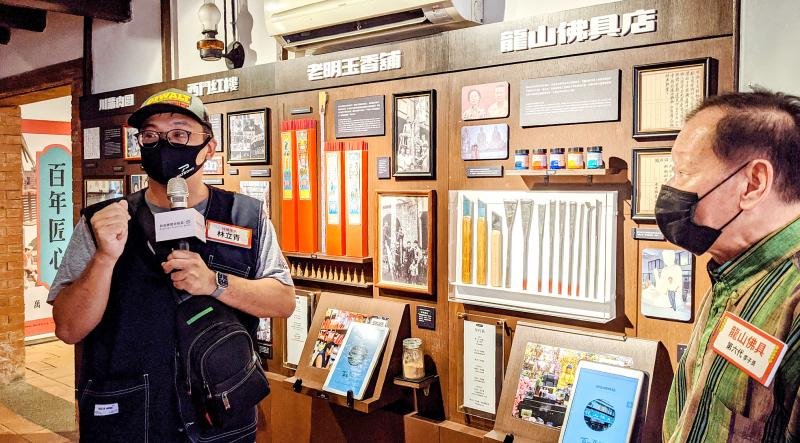
Photo: Han Cheung, Taipei TImes
Interestingly, marriage also played a part in a store’s evolution as the owner’s wife often brought her family’s expertise to the shop. Long Cheng Hao (龍城號) noodle shop added its current menu of various slow-cooked soups this way.
Keeping relevant is also key, as younger owners focus on modernizing while maintaining and refining the family craft.
“Looking on the bright side, the outbreak allowed us time to search for new directions and further hone our skills,” squid soup shop Liang Xi Hao’s (兩喜號) fourth-generation owner Chen Yu-an (陳輿安) says. “There’s a reason we all have been able to survive for 100 years. I hope that over the next 100 years, we business owners can continue to innovate while passing on traditions.”

That US assistance was a model for Taiwan’s spectacular development success was early recognized by policymakers and analysts. In a report to the US Congress for the fiscal year 1962, former President John F. Kennedy noted Taiwan’s “rapid economic growth,” was “producing a substantial net gain in living.” Kennedy had a stake in Taiwan’s achievements and the US’ official development assistance (ODA) in general: In September 1961, his entreaty to make the 1960s a “decade of development,” and an accompanying proposal for dedicated legislation to this end, had been formalized by congressional passage of the Foreign Assistance Act. Two

Despite the intense sunshine, we were hardly breaking a sweat as we cruised along the flat, dedicated bike lane, well protected from the heat by a canopy of trees. The electric assist on the bikes likely made a difference, too. Far removed from the bustle and noise of the Taichung traffic, we admired the serene rural scenery, making our way over rivers, alongside rice paddies and through pear orchards. Our route for the day covered two bike paths that connect in Fengyuan District (豐原) and are best done together. The Hou-Feng Bike Path (后豐鐵馬道) runs southward from Houli District (后里) while the
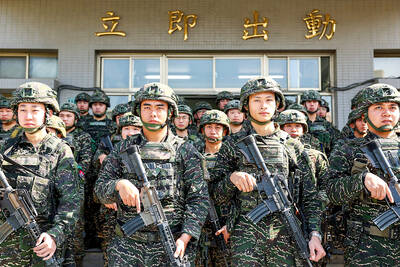
President William Lai’s (賴清德) March 13 national security speech marked a turning point. He signaled that the government was finally getting serious about a whole-of-society approach to defending the nation. The presidential office summarized his speech succinctly: “President Lai introduced 17 major strategies to respond to five major national security and united front threats Taiwan now faces: China’s threat to national sovereignty, its threats from infiltration and espionage activities targeting Taiwan’s military, its threats aimed at obscuring the national identity of the people of Taiwan, its threats from united front infiltration into Taiwanese society through cross-strait exchanges, and its threats from

March 31 to April 6 On May 13, 1950, National Taiwan University Hospital otolaryngologist Su You-peng (蘇友鵬) was summoned to the director’s office. He thought someone had complained about him practicing the violin at night, but when he entered the room, he knew something was terribly wrong. He saw several burly men who appeared to be government secret agents, and three other resident doctors: internist Hsu Chiang (許強), dermatologist Hu Pao-chen (胡寶珍) and ophthalmologist Hu Hsin-lin (胡鑫麟). They were handcuffed, herded onto two jeeps and taken to the Secrecy Bureau (保密局) for questioning. Su was still in his doctor’s robes at